|
Well, I realize that compiling this list took forever. I also know that as I see even more films from 2003, the list itself may very well change. But I figure that it's better to have as comprehensive a list as possible-- better to give truly solid reccomendations instead of rushing and throwing together a half-assed list. So although I missed some notable films such as Elephant and Lilya-4-Ever, I can tell you with a large degree of certainty that these are, from my perspective, the best films of the year.
So why was 2003 special? It wasn't an incredibly good year for film as a whole. But some genres thrived. Animation didn't have a huge quantity of films to offer, but what was there was particularly strong. Look at the list below, you'll see three of the ten films are animated, whether by computer or by paint; one of them in the top five. Many say that hand-drawn animation is going down a hellhole... that's absolutely not true. It is certaintly true for the big studio productions... Disney, in an almost tragic move, closed down its famous animation department in Orlando because of the financial failure of its films (and on a side note, Pixar also seperated from the company... consider the first words of my review of Finding Nemo: "What would Disney do without Pixar?" Now we'll see.) Dreamworks' animated offerings didn't fare so well either. However, you'd think it would be obvious that the reason for this is lack of any fresh ideas coming from any major studios. You can have a number one spot at the box office for a weekend or two, but if a film is no good, it'll eventually peter out into the blue (until a DVD release, but that's a whole different matter). Remember the success of films like Beauty and the Beast or The Lion King... whatever your personal opinions of them, it's widely accepted by most who have seen them that they're damn good films. So that's where Disney and other huge companies are beginning to lack thanks to fear of creativity, and as computer animation and foreign studios begin to diversify and grow in popularity, they've been picking up the slack. They're doing a great job so far.
One genre that absolutely exploded this year was the documentary. I personally feel that documentary films and narrative films are too different to compare on the same list, so in the coming weeks you'll see a list of the best documentary films of last year where I'll offer my comments on their nebworn popularity. But rest assured that it's definitely a good thing.
This was also an amazing year for screen acting. Just sampling the work of 2003's actors is astounding. The amount of honesty and realism was brought to the screen this year makes Sean Penn's statement at the Oscars this year ever the more true: "There is no such thing as 'best' in acting." I can honestly say that all of the films listed below feature amazing casts, whether the film is animated or live-action. Even artistic bombs had their share of great performances.
So, while I still have a few documentaries to catch up on, here are (finally) my thoughts on the best films of 2003.
"Swinging Belleville Rendez-Vous..."
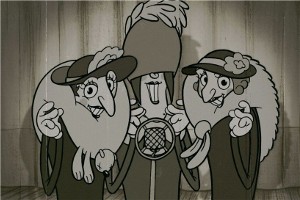 "The Triplets of Belleville" is a quirky, fantastically singular vision. It has such a nasty and wicked edge to it that its hard to deny its energy nor forget its extremities. Since there is practically not a single word uttered throughout the entire film (I counted two sentences spoken, if even that), it relies completely on its images to make an impression. Its opening moments give a good idea of the kind of go-for-broke, no-one-is-safe mockery and delirious excitement that the film provides. What is one of the film's equally persuasive draws is that while it is hilarious and absolutely up-the-wall in its outrageousness, there are fascinating moments of real drama and chilling situations (so this is obviously not a film for young kids). I should also note that "The Triplets of Belleville" always remains pointed in its humor, whether it's by turning its characters into animals (which makes the dog character's development that much more ironic) or its criticisms of excess, this is a film that has got something it wants to communicate. "The Triplets of Belleville" certainly does so, with a loud, fresh voice.
"Where do you want to take the shot? In the hand or in the foot?"
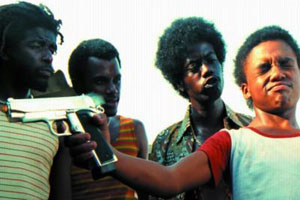
The first thought that comes to mind when describing "City of God" is of absolute suffocation. This is a film that grabs a viewer by the throat and refuses to release them, not because it doesn't trust its audience to understand it, but because it wants to throw their faces right down into the mud. Directors Kátia Lund and Fernando Meirelles feel that they do not have the luxury of being able to lose your attention for a second, so they immerse the film in a hyperactivity so intense as to be almost too much to bear. But "City of God" is also a film of incredible versatility and acuity. In telling the story of an impressive amount of people affected over a ten-plus year span in the Cidade de Deus section of Rio de Janiero, the film finds truth in every one of its characters. It allows us to not only understand, but to feel the thundering impact of all the characters' actions from all perspectives, showing the huge influence of one infamous street gang. The film provides a very interesting complement to José Padilha's documentary "Bus 174", which deals with similar issues in Rio de Janiero through a larger, more political understanding. See that film first, and then zoom in to see "City of God", which brings those issues to an unforgettably upfront human level.
"This was fun, right?"
 Fuck seclusion. If "The Station Agent" has a central message, theme, or moral, that's absolutely it. Not that that's a secret; this is one of the year's most blunt, happily defiant films. The film's protagonist, Finbar McBride, is finally a character that can match, blow for blow, the brazeness of 2001's Hedwig from "Hedwig and the Angry Inch" (even though the two films share almost nothing in common). Peter Dinklage gives one of those performances that united the almost-underground in unadulterated (and completely deserved) love and praise; his wry turn in this film has made him into something of a star with indie film audiences. This is not to overshadow the phenomenal work of his costars: Patricia Clarkson is both hilarious and devastating, and Bobby Cannavale plays dumb with intelligence and verve. "The Station Agent" is a complete joy to watch, and its one wrong moment does not deter the film's charm, comedic expertise, or candidness. It's a testament to the film's strengths that a multitude of moments which could have ended up being horrendously false hit just the right notes. No annoying, preachy aftertaste.
"Maybe he only speaks whale."
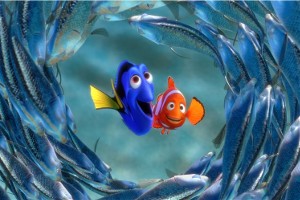
"Finding Nemo" is a film that I have been hard pressed by many to justify my love for. First of all, it is the funniest film I had seen all year in 2003, and that counts for something. Some of the most vivid and memorable personalities from last year came directly from this film. With its episodic structure, director Andrew Stanton and his team at Pixar get to play around with almost any kind of situation they want; from hippie turtles to vegetarian sharks. Not to mention the film contains one of the greatest voiceover performances in animated film history from Ellen DeGeneres, who makes her character (Dory's) dialogue pulsate with life and hilarity. The humor isn't strictly for kids, as there's plenty streamlined within it to appeal to most age groups. I think that "Finding Nemo" represents what is sort of the ultimate family entertainment. It's also nice to know that the storyline of the film, which is all about familial relationships, ends up being genuine and actually comes from a real place (Andrew Stanton, director and co-writer, is a father). Even if you end up hating the film, there is no doubt that one could entertain themselves for a solid two hours just admiring the film's gorgeous, dreamlike animation.
"I don't trust anyone. I guess that's something to work on."
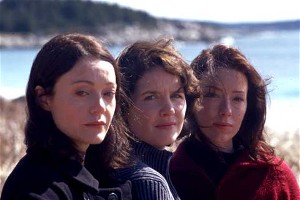 "Marion Bridge" is one of the harder films on this list to discuss in full. Describing its plot and premise, as I've said before, makes the film sound like it "...screams 'soap opera!'" But much of the film's effectiveness relies on how eloquently stated it is. The film plays out like a fine piece of literature; it utilizes every element in its power in a quiet, simple way with a heartbreaking honesty that is so much more rare than we're lead to believe. Its Canadian setting lends the film its seemingly cool, calm atmosphere, drawing up on motifs of coastlines, overcast days and plenty of fog. However, after we spend enough time with the film's characters, we understand that something more dire is pulsating under this tranquility, beyond the physical sickness of one of its leads. The finely written and intricately constructed screenplay (by Daniel MacIvor, who also wrote the play on which the film is based) is acted with fullness and understated pathos by its leads (Molly Parker, Stacy Smith, Rebecca Jenkins and Marguirite McNeil). On a side note, this is one of the first films to come out of The Film Movement, a wonderful hybrid film distribution company and movie-of-the-month club whose films I will be looking at more often from now on.
"I hate you more than I can bear. And I love you... more than I can bear!"
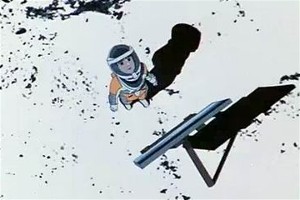 "Millenium Actress" represented one of 2003's precious few cinematic whirlwinds. Seeing it for the first time was exhilirating; it was refreshing to come out of a movie and be completely overwhelmed by its sheer breadth of thematic scope (the only times anything similar happened in relation to a 2003 film are all on this list). "Millenium Actress" is both stunning on an upfront, visceral level, but also creates a true depth of character and intention. With this film, Satoshi Kon blends a huge variety of styles in such a beautifully strange way as has not been done for the longest time (and certainly not in recent anime). By never comitting himself to one style or a defined set of rules, "Millenium Actress" becomes an orgasmically fluid ode to film. While it participates in this delightful kind of cinematic homage (what seems like Japanese Film History 101 on acid), it also commands an enormous power over the simple story of two people coming to a symbiotic understanding with one another. It's not necessarily clear right from the start whose journey we are going on, but when the realization is made, it isn't cheap. Instead, it's the odd blend of the heartwarming and the heart-pounding that Satoshi Kon has proven he can so expertly achieve. This is a risky, experimental film that miraculously seems to work. Unfortunately, Dreamworks failed to see that, and butchered its release in favor of common faire such as "Sinbad" (which, by the way, flopped). Now that the film is out on DVD, it may acquire cult status it deserves. This is one film that is worth searching high and low for.
"Name a shrub after me. Something prickly and hard to eradicate."
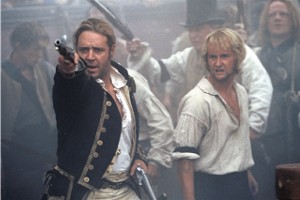 For a film with ten Oscar nominations and nearly 116 million dollars in worldwide box office gold, this is one film that managed to find its home shockingly under the radar. How the hell that happened I'll never know, but I do know that it will find its wide audience on its various home video releases. I also know that this was the most pleasant surprise in 2003. What promised to be a bloated seafaring action film was anything but; in truth it is a brilliant depiction of life and war at sea. "Master and Commander" is a film of deft craft and detail; not a single stone is unturned in recreating the atmosphere of something that has been abandoned for nearly two hundred years. While the film is in the process of showing how miserable and painstaking the sailors' daily trials are, it honestly and remarkably finds the true brotherhood that emerges in that sort of situation. Russel Crowe and Paul Bettany give some of the best performances of their careers, lining their characters with almost unimaginable nuance. Just as their characters know they have to convince their crew that their aide and leadership is worth following, they have an even tougher group to convince... us, the audience. Throughout the course of this unbelievable film, we buy into it all without them pandering to us for a second. Those are onscreen heroics of the best kind.
"This is our school. It is our enemy."
 Ben Coccio's film "Zero Day", about a pair of teens who plan to go on a school shooting spree, has drawn responses that rest on completely polarized ends of the spectrum. Some have found it shocking and unnecessary (although many of these critics are more abject to the idea of a film being made about this subject than the film itself). I am obviously on the other side. "Zero Day" is a quietly daring, explosively alive film. Like its cinematic counterpart, "Elephant", which it has (often unfairly) been compaired to, it does not provide find obvious answers to why this sort of thing can occur. However, I found it to be much more active in that respect than most who saw it. While it is taking an up-close look at the lives of its two teens (Cal and Andre), it finds something that is not as uncommon in teenage life as some may think. The film makes a point of showing that these are not complete lunatics, nor are they the stereotypical depressed punks that are often envisioned to be behind this kind of violence. They are merely people who have been cast out from pathetic high school hierarchies, and because of this, they develop an extreme superiority complex. They know that they're above all the rediculous high school pressures (Cal even directly tells the camera how he "knows things"), but they take it to an extreme level. While many people may take some elements of their characterizations as exploitation, it's not so hard to believe that there are people out there who would think like that. I know plenty of them.
"I open my eyes and see nothing..."
 Many audiences that have seen "Russian Ark" have viewed it from a distinctively political lens. That is absolutely one layer of the film; historians and anyone who understands Russian history will find a goldmine of fascinating (and specific) political theories to chew on, as well as musings on Russian art. Does Russia really have its own culture, or does it just feed off of the artistic inspiration of other countries? But these are the most merely the first layer of an extroardinarily complicated film. The film has a very strong sense of mysticism and spirituality to it, which is so involving that it creates a completely enveloping cinematic experience. By making the choice to shoot the film in one shot in a bleak, noncolorful style, director/writer Aleksandr Sokurov has made some very definite choices. "Russian Ark" finds a surreal flow of time that allows the viewer to float in and out of various phases in Russian history, and by doing so Sokurov remarkably enforces the idea of all history as cyclical and familiar under a new kind of spell. By using the somewhat drained-out color palate that he does, his camera does not glorify the royality parading before the camera, but instead both calmly celebrates its beauty and criticizes its faults under a scrutinizing kind of lens. Notice in the last scene, of one of Russia's last royal balls, how Sokurov takes the camera through every inch of the dance, creating a breathtaking mood... and then begins to calm down, walking through the crowd and exposing it for the banality and madness that it is. The final moments are rich in symbolism, providing the thesis that while royalty is forever in search of immortality through pomp and overglorification, those who will truly live forever are those who can learn from history and move on, those like the film's "man making the coffins" or "lady in rags". "Eternal people".
"Death is just another path... one that we all must take. The gray rain-curtain of this world rolls back, and all turns to to silver glass, and then you see it... white shores; and beyond them, a far green country under a swift sunrise."
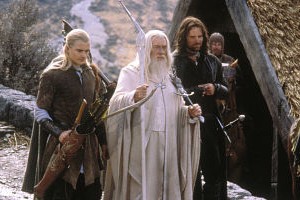
Forget, for a moment, the huge amount of awards, accolades, and hyperbolic love slathered all over this final installment of "The Lord of the Rings". Forget the worldwide obsession and Trilogy Tuesdays that made December 2003 the month of all things Rings. Forget the enormous box-office intake; forget the impact these films have had on New Zealand. Forget this is one of the biggest films ever made, and that this is one of the best third films in the history of the linear film trilogy. Forget all of this, and what remains is an absolutely beautiful film. The scope of this "Lord of the Rings" project has become legendary by now. It's true that, as I said in my original review, the way Peter Jackson intertwines the brilliant action sequences with the destinies of the characters is perfection, but I sense there's something else going on here that is true to Tolkein's original intent. As the first two films in the series-- "The Fellowship of the Ring" and "The Two Towers"-- were films about a world on the edge of destruction, "The Return of the King" is an exhaustive and pained parable of destruction, death, and the grevious process of rebirth. Through its action, interpersonal drama and symbolism (both subtle and obvious), "The Return of the King" excruciatingly paints a picture of a world with its last vestiges of hope being suffocated. This is the kind of story that needs to be told through fantasy-- the characters discuss "the end of all things", the sickening of their universe... to have such an apocalyptic vision in our "real world" would come off as cheap disaster film tactics, but through a vision as real and exotic as Middle Earth, "The Return of the King" turns out to be something beyond extroardinary.
|